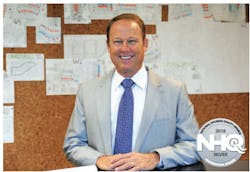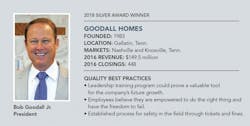Empowered to Solve: Goodall Homes 2018 NHQ Silver
Bob Goodall Jr. had a hunch that his company wasn’t achieving its potential. “I knew that we probably weren’t doing as well as we could be with our customer satisfaction and our construction quality. And so if the judges had awarded us Gold, it would have been bittersweet because then your team thinks ‘We are there,’ and I’m thinking ‘We’re not there yet,’” says Goodall, the company’s president and founder.
The NHQ judges saw the quality mindset among senior managers, but to get to its goal of 1,000 closings in the next five years, the Tennessee builder needed to have that culture translated throughout the company, particularly in the field. Recommendations for improvement included: using warranty data and establishing other metrics to identify patterns in construction problems; developing process improvement with trade partners; and identifying drivers for customer satisfaction. However, the panel of examiners did see a company culture striving for improvement, employees empowered to solve problems, and enough quality management practices to award Goodall its second Silver in three years.
Goodall’s best NHQ scores were related to how well the company links employees to its strategic plan. The judges noted that, “Team members love the family culture,” and they were impressed by how the company’s performance is clearly and visually communicated to align employees with company goals. Data dashboards visually show the builder’s progress with charts and graphs. The global Goodall dashboard posted in the company’s training room has five rings, similar to the Olympic rings, each representing a key financial metric: sales, gross margin percentage, closings, overhead, and net profit percentage. Metrics that are on target with the annual plan are color coded green and the rings projected to fall short are red.
INSPIRATION FROM A RESPECTED SOURCE
During summer 2016 when the builder was at risk of not meeting annual targets, employees formed six teams and created “games” to raise gross profit, decrease overhead, and increase closings. The games are a product of the builder’s open-book management culture, which is inspired by the The Great Game of Business, by Jack Stack. The book advocates a management style where financial statements are shared with employees, who are coached to think and act like owners by keeping score and by having a stake in the game through profit sharing and bonuses. That alignment between employees and Goodall’s goals resulted in a $1.4 million increase in net profit and a 19 percent bonus payout for employees.
Leadership development is another Goodall best practice. Senior managers are upgrading their skill sets through Ignite, an executive program offered by Clayton Homes, the Berkshire Hathaway subsidiary that acquired Goodall Homes last year. Some Ignite elements were implemented in Goodall Homes University, which launched in April. GHU aims to increase employees’ competence and mastery of skills and disciplines and equip staff to become effective business leaders. The initial curriculum includes classes such as New Hire Orientation, Leadership Boot Camp, Manager Identification Process, Customer Service Best Practices, and Leader/Manager Functions, which can help employees answer the question, “Is management for me?”
With the company’s recent expansion outside Middle Tennessee into Knoxville, the judges commented that, “Utilizing the talents of well-performing, experienced team members to start up the satellite office should provide a great foundational start in the new market.”



